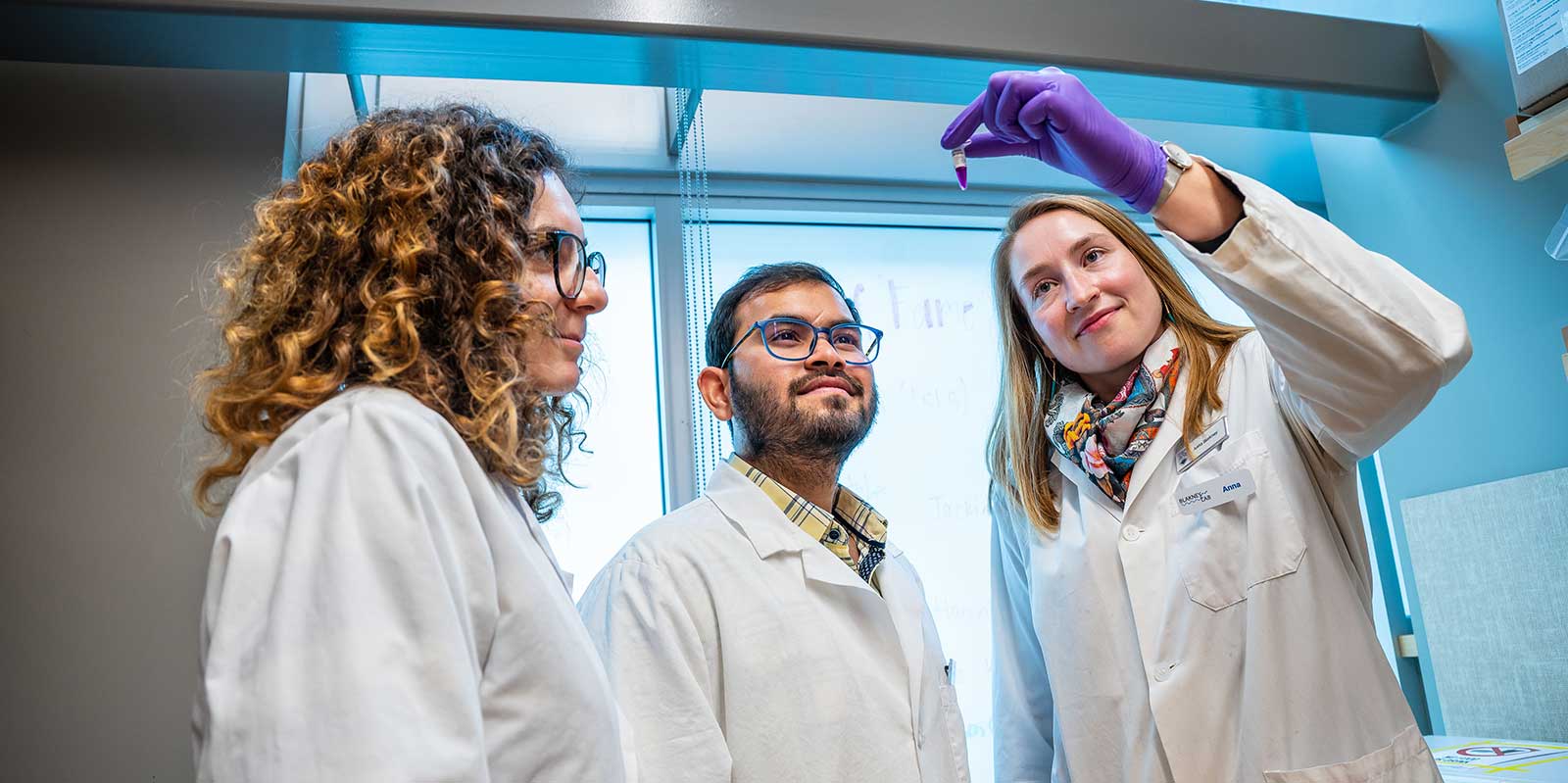
Canada’s Immuno-Engineering and Biomanufacturing Hub research teams awarded $140M in federal funding
Table of Contents

Today, the Government of Canada announced an investment of $140 million in projects associated with Canada’s Immuno-Engineering and Biomanufacturing Hub (CIEBH) — a UBC-led national research hub with more than 50 academic, industry, not-for-profit and health sector partners.
The four supported projects will accelerate the development and manufacturing of lifesaving medicine for patients and communities across Canada. Together, these projects will enable Canada to rapidly respond to future pandemic threats — in less than 100 days — and address some of the most pressing health challenges facing Canadians today.
The CIEBH projects were announced as part of a larger investment by the Government of Canada to further grow the domestic biomanufacturing and life sciences sector and prepare Canada for future health emergencies. The Honourable Soraya Martinez Ferrada, Minister of Tourism and Minister responsible for the Economic Development Agency of Canada for the Regions of Quebec, on behalf of the Honourable François-Philippe Champagne, Minister of Innovation, Science and Industry, and the Honourable Mark Holland, Minister of Health, announced nearly $574 million in funding for 19 projects at 14 research institutions across Canada, through Stage 2 of the integrated Canada Biomedical Research Fund (CBRF) and Biosciences Research Infrastructure Fund (BRIF) competition.
Each of the 19 projects is endorsed by one of the five research hubs that were established in Stage 1 of the CBRF-BRIF competition.
CIEBH will be hosting a formal media announcement and sharing additional details of the funded projects in the coming weeks.
Funded CIEBH projects
The projects bring together interdisciplinary research teams from across CIEBH’s coalition of academic, industry and health sector partners. Three of the four CIEBH projects are led by UBC researchers and were awarded a combined $125 million. A fourth project, led by Simon Fraser University, was awarded over $14 million.
Advanced Therapeutics Manufacturing Facility (ATMF)
- Lead Institution: UBC
- Project director(s): Megan Levings (The University of British Columbia), Robert Holt (Simon Fraser University, The University of British Columbia)
- Team Members: Sara Belga (The University of British Columbia); Anna Blakney (The University of British Columbia); Karen Cheung (The University of British Columbia); Pieter Cullis (The University of British Columbia); Laura Evgin (The University of British Columbia); Bhushan Gopaluni (The University of British Columbia); Kevin Hay (BC Cancer Research Institute); Eric Jan (The University of British Columbia); Julian Lum (BC Cancer); Brad Nelson (The University of British Columbia); James Piret (The University of British Columbia); Nika Shakiba (The University of British Columbia); Peter Zandstra (The University of British Columbia)
- Biosciences Research Infrastructure Fund Award: $41.76 million
AVENGER: Advanced LNP RNA Vaccines Engineered with Next-Generation designs to Enhance pandemic Readiness
- Lead Institution: UBC
- Project director(s): Pieter Cullis (The University of British Columbia), Anna Blakney (The University of British Columbia)
- Team Members: Shashi Gujar (Dalhousie University); Ken Harder (The University of British Columbia); Susan Howlett (Dalhousie University); Jayachandran Kizhakkedathu (The University of British Columbia); Amy Lee, (Simon Fraser University); Kelly McNagny (The University of British Columbia); Fabio Rossi (The University of British Columbia); James Russell (The University of British Columbia); Manish Sadarangani (The University of British Columbia); Natalie Strynadka (The University of British Columbia); Aneesh Thakur (University of Saskatchewan)
- Canada Biomedical Research Fund Award: $18.65 million
- Biosciences Research Infrastructure Fund Award: $12.76 million
PROGENITER: Pathogen Response Optimization by GENeratIng ThErapeutics Rationally
- Lead Institution: UBC
- Project director(s): Sriram Subramaniam (The University of British Columbia)
- Team members: Horacio Bach (The University of British Columbia); Anna Blakney (The University of British Columbia); Annie Ciernia (The University of British Columbia); Khanh Dao Duc (The University of British Columbia); Leonard Foster (The University of British Columbia); Eden Fussner-Dupas (The University of British Columbia); Eric Jan (The University of British Columbia); Kayla King (The University of British Columbia); Kelley Lee (Simon Fraser University); Shyh-Dar Li (The University of British Columbia); Larry Lynd (University of British Columbia); Ralph Pantophlet (Simon Fraser University); Steven Plotkin (The University of British Columbia); Maria Tokuyama (The University of British Columbia)
- Canada Biomedical Research Fund Award: $14.46 million
- Biosciences Research Infrastructure Fund Award: $16.40 million
Social Sciences and Humanities (SSH) Consortium for Strengthening Canada’s Immuno-Engineering and Biomanufacturing Pipeline
- Lead Institution: Simon Fraser University
- Project directors: Kelley Lee (Simon Fraser University), Ève Dubé (Université Laval)
- Team Members: Ahmed Al-Rawi (Simon Fraser University); Timothy Caulfield (University of Alberta); Wendy Chun (Simon Fraser University); Colleen Flood (Queen’s University); Maya Gislason (Simon Fraser University); Janice Graham (Dalhousie University); Cynthia Jardine (Cindy) (University of the Fraser Valley); Jillian Kohler (University of Toronto); David Patrick (British Columbia Centre for Disease Control); Katrina Plamondon (University of British Columbia); Diego Silva (University of Sydney); Julia Smith (Simon Fraser University); Maxwell Smith (Western University); Heidi Tworek (The University of British Columbia)
- Canada Biomedical Research Fund Award: $13.56 million
- Biosciences Research Infrastructure Fund Award: $0.63 million
The total $140 million investment in these projects also includes $21.4 million awarded through the CFI’s Infrastructure Operating Fund (IOF) to cover the costs of operating the research infrastructure.
